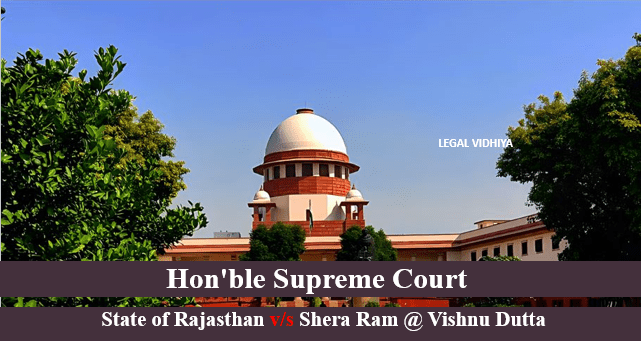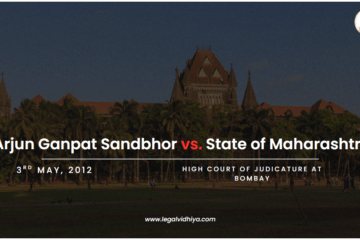
| Citation | AIR (2012) SCC 602 |
| Date of Judgement | 1 December 2011 |
| Court | Supreme Court of India |
| Appellant | State of Rajasthan |
| Respondent | Shera Ram @Vishnu Dutta |
| Bench | Swatanter Kumar, Ranjana Prakash Desai |
| Referred | Sec. 302, 295, 449, 84 of the Indian Penal Code |
| Case Type | Criminal Appeal No. 1502 of 2005. |
FACTS OF THE CASE –
The Supreme Court of India heard the case of State of Rajasthan v. Shera Ram, which is detailed in (2012) 1 SCC 602. Shera Ram was the respondent in the case, and the State of Rajasthan was the appellant. The primary question in the case was whether Shera Ram, the respondent, had committed murder in violation of section 302 of the IPC and was also charged for committing an offence under section 295 and section 449 of the Indian Penal Code. It happened on May 15, 2008, when Shera Ram’s wife was discovered dead in their home in Rajasthan. Shera Ram was given a life sentence by the trial court. The prosecution failed to prove Shera Ram’s guilt beyond a reasonable doubt, so the High Court cleared him of all charges based on the benefit of the doubt and on the grounds that he was a person of unsound mind at the time of the incident, as defined by Section 84 of the IPC. The State of Rajasthan challenged the High Court’s ruling to the Supreme Court in an effort to have Shera Ram found guilty of murder. The prosecution used circumstantial evidence including witness testimony, forensic findings, and medical data during the trial to prove Shera Ram was responsible for the murder. The prosecution’s case, according to the defence, was founded on flimsy and unreliable evidence, and the witness testimony contained several contradictions. The Supreme Court analyzed the evidence presented by both parties and after careful consideration, upheld the decision of the High Court, acquitting Shera Ram on the ground of benefit of doubt.
ISSUES –
- Can Shera Ram be held guilty under Section 302 of the Indian Penal Code?
- Can Shera Ram be acquitted due to the application of principle of benefit of doubt?
- Whether the prosecution had met the required standard of proof and whether the whether the evidence was credible enough to establish Shera Ram’s guilt?
ARGUMENTS ON BEHALF OF THE APPELLANT’S SIDE –
- Pujari Tulsi Das (now deceased) was in the Raghunathji’s temple on March 10, 1999, at around
7.15 a.m., when the Respondent suddenly threw a stone on his head, causing his instantaneous death, according to the prosecution. The respondent also harmed the temple’s idol and further assets. Everything was unprovoked. The villagers, including PW-6 Santosh, PW-11 Narsingh Ram, and PW-16 Smt. Tiku Devi, were there when the incident occurred.
- PW-2 Ghan Shyam Das Daga straight away reported the incident to the police. After receiving the information, the police opened an investigation and registered a case under Section 302 of the Indian Penal Code. The Investigating Officer also created the site structure and the inquest memo in addition to taking witness testimony. The deceased person’s body was sent for a post-mortem by PW-20, Dr. C.P. Bhati, who also wrote the post-mortem report Ext. P-37.
- Up to 23 witnesses were questioned by the prosecution to support its claims. The relevant pieces of evidence in the prosecution’s case against the respondent were presented to him, and the learned Trial Court recorded his testimony in accordance with Section 313 of the Code of Criminal Procedure, 1973 (abbreviated “CrPC”).
ARGUMENTS ON BEHALF OF THE RESPONDENT’S SIDE –
- The Respondent claims that from 1992 to 1993, his mental health was poor and that he periodically experienced fits of lunacy. He had received the same kind of care. He has claimed that he was receiving treatment both inside and outside of prison. Simply put, he invoked Section 84 of the Indian Penal Code, the insanity defence. The defence also cross-examined DW-2, Dr. Vimal Kumar Razdan, and DW-1, Bhanwar Lal, the respondent’s brother, who had provided documentation demonstrating that the respondent was mentally ill. The Respondent was found guilty by the learned Trial Court after the claim of insanity was rejected.
- The Respondent filed an appeal against the Trial Court’s verdict and order of conviction, which led to his acquittal by order dated February 21, 2004, along with the notice to the State Government described above. The State chose to file an appeal because it was unhappy with the judgement.
COURT –
The High Court changed the judgement of conviction into a judgement of acquittal, as is clear from the aforementioned recorded findings. Therefore, the most important question that needs to be answered is when this Court should interfere with the acquittal judgement. The State may only appeal against an order of acquittal to this Court with the Court’s permission. In contrast, the right of appeal for the accused is treated as an absolute right subject to the provisions of Articles 134(1)(a) and 134(1)(b) of the Constitution of India and Section 379 of the Code of Criminal Procedure, 1973, if the High Court vacates the trial court’s judgement of acquittal and the accused is sentenced to death, life in prison, or imprisonment for more than 10 years. This makes it clear that an appeal against acquittal is evaluated using slightly different standards than a regular appeal submitted to this Court.
A well-established rule in criminal law is that the prosecution has the burden of proof and must establish an accusation beyond a reasonable doubt. The presumption of innocence and the right to a fair trial are the two main protections afforded to the accused by our criminal justice system, but once the prosecution has established its case and the evidence presented by it points inexorably towards the conclusion that the accused is guilty, the court may intervene even in the case of an acquittal. The decision to acquit could have been made in contravention of established rules of criminal law or based on an incorrect evaluation of the evidence.
We are able to make reference to a few of this Court’s rulings. In the matter of State of M.P. v. Bacchudas[1], the trial court had found the defendant guilty of an offence punishable under Section 304 Part II read with Section 34 IPC, but the Madhya Pradesh High Court had ruled him not guilty. This Court dismissed the appeal on the grounds that the Supreme Court should only intervene when there were good and convincing grounds to do so.
When admissible evidence is disregarded, the appellate court has a duty to reconsider the evidence in cases where the accused have been exonerated in order to determine if any of the accused actually committed a crime or not. It has been mentioned in State of M.P. v. Bhagwan Singh[2].
The appellate court must adhere to the rule that it should only intervene where there are strong and significant reasons to do so when it is hearing an appeal against an acquittal judgement. It is a compelling ground for intervention if the challenged judgement is obviously irrational and appropriate and convincing evidence has been improperly excluded during the proceeding. These
aspects were highlighted by this Court in Shivaji Sahabrao Bobade v. State of Maharashtra, Ramesh Babulal Doshi v. State of Gujarat, Jaswant Singh v. State of Haryana, Raj Kishore Jha v. State of Bihar, State of Punjab v. Karnail Singh, State of Punjab v. Phola Singh, Suchand Pal v. Phani Pal and Sachchey Lal Tiwari v. State of U.P.
CONCLUSION –
The fact that the respondent’s injuries to the dead were sufficient in the normal course of nature to cause death cannot be shown in the current case either by oral or written evidence. This, however, cannot be said to be an absolute proposition of law, and whether or not the specific injury was sufficient in the normal course of nature to cause death is a factual issue that must be resolved in light of the particular facts, circumstances, and evidence in each case. (See Halsbury’s Laws of India, 5(2) Criminal Law-II).
In some circumstances, injuries sustained by the deceased’s body alone may be sufficient to prove that death resulted from natural causes, whereas in other circumstances, it may be necessary to provide documentary and oral evidence to support the claim. It will therefore always depend on the specifics of each instance. Therefore, it may not be practicable or appropriate to articulate a universally applicable absolute concept of law in such circumstances.
REFERENCES –
Written by Shashank Sandesh Verma an intern under legal vidhiya.



0 Comments